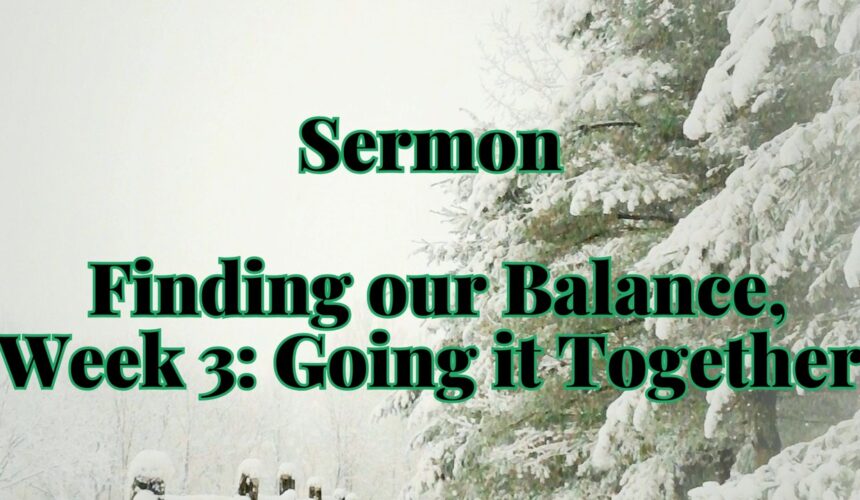February 16, 2025
Ruth 1:12 – 18
Before I started my work as Pastor here at U Park, I was serving at St. Andrew United Methodist Church, 8 or 10 miles south of here on University Boulevard. My first day at St. Andrew was a Saturday rather than a Sunday, because they were working on a strategic plan for the church and having a big gathering to talk about their hopes and dreams for the future. I thought that sounded like a good way to learn about the congregation, so I went. Everybody gathered in a big room around these round tables, and a facilitator asked a series of questions for people to discuss. After we talked at our tables, people began to stand up and share what they had heard with the larger group.
One of the first questions they were asked was what they loved about their church. And when it came time to share the answers in the larger group, a man who I would eventually get to know pretty well stood up. He said, “what I love about this church is the way I can meet people I would never get to know otherwise, people I would never get to know if I wasn’t part of this congregation.” He said, “a lot of you here know me. You know I’m a hardcore conservative Republican. One of my best friends here is a liberal Democrat. I’m a small business owner, he’s a social worker. I’m heterosexual, he’s gay. But he’s one of my closest friends in the world. It’s unusual for us to go two or three days without talking to each other. And if we do, we’ll call each other up just to see how things are going. Where else would I have met him but here at this church?”
Of course part of the answer is that those two could have met at a place like this too, here at U Park. But I know what he meant. I’ve been incredibly blessed in my ministry to get to know people from a tremendous range of backgrounds: committed peace activists and military personnel, C-Suite executives and people living on the ragged edge of homelessness (or sometimes living on the street but coming to church because they know here they’ll be welcomed and treated with dignity). I’ve known professional athletes and quadriplegics barely scraping by on disability; career criminals and law enforcement officers; people wrestling with addiction and addiction counselors; indigenous people and new immigrants. And that’s all because I’ve been part of churches. Where else would I have gotten to know such a rich group of people, but here in church?
Today is the third Sunday of this sermon series that I’m calling “Finding Our Balance.” It’s not exactly cutting edge social commentary to say that we are living in chaotic and turbulent times. Words like “constitutional crisis” are in the news every day, but there’s no agreement on what they mean or what we would do if we recognized that we were in one. People are sharply divided about the problems our society faces and even sharply divided about what those problems are, let alone what should be done about them. For years now, a lot of us have had the experience of losing friends or having family relationships torn apart because of political or social disagreements. And it’s easy, at a time like this, to want to just retreat from all of it. I don’t know about you, but I find myself wanting to go back to bed and pull the covers over my head, stop paying attention to current events, give in to the fatigue and sadness that come from watching our country tear itself apart. It’s exhausting and toxic, and I feel it every day.
Now I know that sometimes, we do all need to go back to bed and pull the covers over our heads. We need a break from the chaos. We need to rest. But like I’ve said for the past few weeks, I do think Christians are called to do more than just retreat. I think part of the church’s work right now is to tend our social wounds, to help create a more compassionate and nurturing environment for everybody. I think our faith life, our spiritual practices, are more necessary than ever now. We need them, and I’m presumptuous enough to believe that our world needs us to practice them.
I’ve talked before about being part of this group here in Denver called the Multi-Faith Leadership Forum, started by our former Pastor Paul Kottke. At our meeting this past week, a Rabbi who’s part of that group described our challenge in as clear a way as I’ve heard. He asked, “How can we and the communities we serve be a calm, non-anxious presence in this time, without simply being bystanders?” I think that’s the challenge for all of us.
So for the past couple of weeks, and for a few weeks more, I want to focus on some ways that the resources of our faith can help us find our balance – and from that stance of balance, take the action we may feel called to take to respond to the urgent needs around us.
Two weeks ago, we looked at Nicodemus, in the Gospel of John. Nicodemus is a Pharisee. He’s a well-regarded religious leader in 1st century Jerusalem, who finds himself increasingly drawn to the way of life Jesus teaches. When Nicodemus hears the High Priest and other leaders in Jerusalem plotting to have Jesus arrested and killed, he tries to call them back to who they are by reminding them of their own tradition. He reminds the temple leadership their own laws say no one should be condemned without at least a fair hearing. He’s inviting them to live by the principles they profess.
Of course, in the Gospel story Nicodemus is shouted down and ignored. But it seems to me that if we’re willing to take that kind of risk in our time, to speak up for the best parts of our tradition, even if we are also shouted down and ignored, our efforts may not be wasted. We may inspire courage and wisdom in others. We may spark the imaginations of others. God may be doing more through us than we realize.
Last week, I focused on how in his trial, when Jesus is dragged before the religious leadership of Jerusalem and before the Roman Governor Pilate, he chooses to keep silence. He chooses not to respond to their hatred and their puzzlement and their accusations. Like I said last Sunday, it’s not like Jesus can’t speak effectively. He does it all the time. But in this case, he decides not to.
People have different ideas about why he makes this choice. Maybe in that moment he knows clearly that he is called to the cross. Or maybe he simply sees that the entire proceeding is rigged and nothing he says would make any difference. But whatever his reason, in that moment he chooses not to speak.
I think maybe there’s a lesson in that for us. We can do the same thing. We don’t have to have a smooth, prepared, decisive answer to every political provocation. We don’t have to be baited into reactivity every time someone says something that we disagree with socially or politically. We can choose not to respond. We can choose when and how to respond. We can choose to listen deeply, modeling the full and gracious attention God is always giving us. Strategic silence is not the same as choosing to do nothing. Mindful, intentional silence can have a transformative effect.
This morning, we heard a passage from the Biblical Book of Ruth. The Book of Ruth is very short; in most Bibles it’s somewhere between three and five pages long. In the beginning, we’re told that during a time of famine, a Hebrew man named Elimelech travels with his wife Naomi and their two sons from Bethlehem into a foreign territory called Moab, presumably because there’s food there.
Twenty first century readers wouldn’t necessarily know this, but there was a long history of hostility between Moab and the Hebrew people; the Book of Deuteronomy even says “no Moabite shall ever be admitted into the Assembly of the Lord…you shall never promote their welfare or prosperity as long as you live.” So this is a pretty serious feud. But somehow, Elimelech and his family manage to settle in Moab anyway. But then there’s a series of tragedies. First Elimelech dies. His sons marry Moabite women, and then the sons also die. So as the story begins, we have three women: Naomi, who’s a Hebrew, and her two Moabite daughters-in-law, alone in a culture where women were completely dependent on men for protection, for housing, for food, for survival.
Naomi decides that her best chance is to travel back home, where at least she’s got some extended family that might take her in. She tells her daughters-in-law there’s nothing for them where she’s going, that they should return to what Naomi calls “the house of your mothers.” And in a beautiful, poignant scene, with all three women weeping and not wanting to part, Ruth decides to go with Naomi. She makes the beautiful declaration of loyalty we heard (Liz) read: “where you go, I will go. Where you lodge, I will lodge. Your people shall be my people, and your God my God. Where you die, I will die, and there I will be buried.” In our society’s terms, we might say that Ruth is committing to Naomi even though it means that she will become an immigrant in a land where people will hate and suspect her.
For such a short little book, the story of Ruth gets pretty complex. There’s a lot in here about ancient Israelite marriage customs and property rights and land transfers and farming and law. But for me, the beauty of the story is that from start to finish, it’s driven by improbable relationships, improbable human commitments. A Jewish family who makes their home in the land of Moab; their sons who marry Moabite women; the commitment of the Moabite woman Ruth to the Jewish woman Naomi; the romance that springs up between Ruth, who by then is a widow, and Boaz, another Jewish man she meets in Naomi’s home town: the story of Ruth depends on people who are committed to relationships that reach across vast differences of culture and geography and history. And eventually there’s kind of a surprise ending. The last verse or two of the Book is a genealogy, a list of the people to whom Ruth is now related by marriage, and those who descend from her. And in that genealogy, we learn that Ruth, this foreign woman from a tribe of enemies, is the great-grandmother of King David, Israel’s most revered ruler.
Of course, Ruth could not possibly have known that. Boaz, her husband, could not possibly have known that. Naomi could not have known it; none of them could know how their lives would sow the seeds of the future. And of course, none of us do either. But now as then, maybe God’s work in the world is moved forward by human love and commitment, in all of our differences and our flaws and our beauty. And maybe church is a place where we practice that commitment – like my friends at St. Andrew, like so many people I’ve known in churches who despite all of our differences, can see the importance of creating a community where we can say to each other, “your people are my people, and your God is my God.” That community may sustain us. It can help us find our balance. Just as importantly, it may help sustain and bless a divided and angry world.


